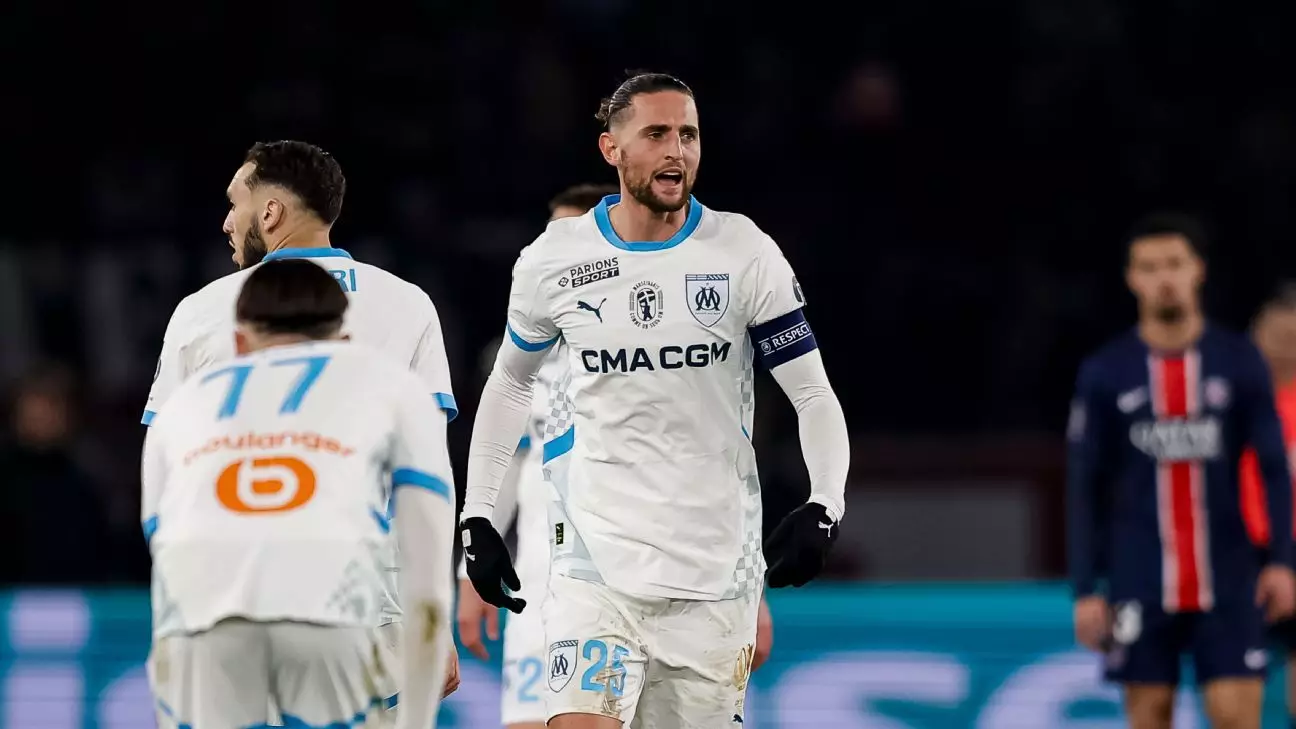The recent Ligue 1 clash between Olympique de Marseille and Paris Saint-Germain (PSG) was overshadowed by a myriad of issues far more serious than the resultant scoreline of 3-1. Marseille midfielder Adrien Rabiot found himself embroiled in controversy that transcended the pitch, igniting a fierce conversation surrounding racism and the moral fabric of football. Following the raucous match, Rabiot took to social media, targeting PSG president Nasser Al-Khelaifi with striking statements regarding class and integrity. His post, “You can’t buy class,” became a rallying cry, showcasing how wealth does not equate to character.
A Response to Abuse
Rabiot’s outburst wasn’t solely a reaction to the demoralizing defeat. The real impetus was the abhorrent display of anti-gay and racist chants coming from the stands, specifically directed at him—a player who once donned the PSG jersey. The hostility he faced upon returning to his former team is a stark reminder of football’s dark underbelly. As he expressed his disgust over chants that insulted his mother and mocked his deceased father, it became apparent that this was more than just a football match for Rabiot; it was a deeply personal experience confronting the ugly realities of football culture.
Rabiot’s mother, Véronique, echoed her son’s sentiments on Radio France, expressing disbelief over the lack of intervention during such overt displays of hate. Her declaration that she intends to file a complaint against the PSG fans demonstrates a willingness to combat not just personal attacks but broader systemic issues that allow discrimination to fester unchecked. This raises an important question: Why are some games intervened in and not others? The inconsistency of action by referees adds another layer of complexity to an already toxic environment.
The Need for Accountability
Despite the regulations and internal measures within Ligue 1, including a protocol that allows referees to halt matches for discriminatory actions, the effectiveness of these policies seems dubious at best. The match at Parc des Princes exemplified the failure to enforce these rules, as referee Clément Turpin opted not to pause the game despite a barrage of offensive chanting. The long-standing tolerance of such behavior, especially within certain fanbases, illustrates a troubling disconnect and a reluctance from league officials to confront difficult truths.
Following the match, the French social justice group Rouge Direct vocally criticized the ongoing discrimination, urging authorities to take definitive action against such violent displays of hatred. The glaring need for a robust response to this culture of impunity is evident, and the call for harsher sanctions is a necessary step towards accountability not just for the clubs but for the individuals who perpetrate such reprehensible acts.
Historical Context of Football’s Toxicity
This ongoing saga is not isolated; it is part of a broader narrative within football that has been brewing for years. French soccer has witnessed a disturbing pattern of discriminatory chants and actions, often brushed under the carpet by clubs and the league alike. Notably, previous incidents involving PSG fans have led to fines and, at times, stadium closures, yet the cycle continues, suggesting a failure to satiate the deeper cultural wound.
Furthermore, the pervasive nature of anti-gay and racist insults at Ligue 1 matches highlights a societal issue that mirrors broader concerns within France. The parodying of a rival group not only belittles them but also reveals the underlying prejudices that, by now, should have been eradicated from the sport. It’s as if the football stadium has become a microcosm of societal ills, where vitriol masquerades as passion.
The Imperative Shift in Attitudes
As Adrien Rabiot rises to prominence as a symbol of resistance against this toxic atmosphere, it underscores a critical demand for change both on and off the pitch. One voice can inspire many, and his refusal to remain silent is a beacon of hope in a sport that has often overlooked fundamental moral values in favor of profitability and celebrity. The actions of fans, players, and officials will determine the future landscape of football. Will it evolve to embrace inclusivity, or will it remain shackled by outdated beliefs and practices? The choice lies in the hands of those who love the game and empower voices like Rabiot’s to pave the way for genuine progress.


Napsat komentář